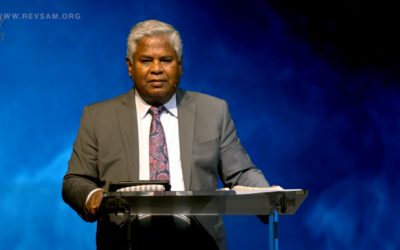
How Grace Changes Us? (Part 6): Kindness
Sunday English Service – 02 JAN 22
Transcript
Please turn with me to Ephesians, chapter 4 and let me read to you from verse 29 onwards. And also keep turned to John’s Gospel, chapter 15. I will read Ephesians first: Let no corrupt word proceed out of your mouth, but what is good for necessary edification, that it may impart grace to the hearers. And do not grieve the Holy Spirit of God, by whom you were sealed for the day of redemption. Let all bitterness, wrath, anger, clamour, and evil speaking be put away from you, with all malice. And be kind to one another, tender-hearted, forgiving one another, even as God in Christ forgave you. Therefore, be imitators of God as dear children. And walk in love, as Christ also has loved us and given Himself for us, an offering and a sacrifice to God for a sweet-smelling savour.
Turn with me to John’s Gospel, chapter 15; let me read to you from verse 12, to 15. John 15:12: This is My commandment, that you love one another as I have loved you. Greater love has no one than this, than to lay down one’s life for his friends. You are My friends if you do whatever I command you. No longer do I call you servants, for a servant does not know what his master is doing; but I have called you friends, for all things that I heard from My Father I have made known to you.
We’ve been teaching, the last several weeks, I’ve been going through this teaching in a particular direction, talking about how grace changes us. Now, in this, remember a few weeks ago, we touched on 1 Corinthians 13. And from there, we’re going in a direction where we’re talking about how the inward change happens in a Christian’s life. In 1 Corinthians 13:3, there is a real turning point. 1 Corinthians 13 is well known to all Christians because it’s a famous chapter on love. But I don’t know if you’ve noticed something about that chapter, particularly that verse 3, there is a turning point there, where he says, “If I give away all my goods to the poor, and if I die for the faith, but I have not love, I gain nothing.” In verse one and two, it speaks on other things like “speaking with tongues of men and of angels”. Even though I speak in tongues of men and angels, and have not love, I have become sounding brass and a clanging cymbal. In verse two, it says, “Even though I have the gift of prophecy, understand all mysteries and knowledge, and though I have all faith that I could remove mountains, but have not love, I am nothing.” But then, verse three is a real turning point, I believe, where he says something very significant. What he’s saying is this, when he says, “If I give away all my goods to the poor, if I die for my faith, but I have not love, I gain nothing.” By that statement, he is really saying—I don’t know if you’ve ever noticed this—that it is possible to do all of the morally virtuous things that anyone can list. It’s possible for somebody to do all the morally virtuous things without ever having gone through a particular change in the heart, without ever God touching a person’s heart, changing a person’s heart. It is possible for a person to even sell everything that he has and give to the poor, and even to really die for something that we believe and sacrifice our whole life, literally. Now, that is a very big statement to make.
In other words, it’s possible for somebody to live a very virtuous-looking life, morally virtuous behaviour can be seen and really visible in a person’s life but yet, not be touched by God at all, in their heart, not be changed at all by God in the heart. “It’s possible”, he says, because that’s what the statement says, you know. If I give away all my goods to the poor, if I die for my faith, but have not love, I gain nothing. That means, it’s possible to do all of these things without having gone through a change in the heart. That means the person does those things for some other reason, for some other motivation; the motivation is not love, it is something else, Now, if that is true, then verse 4, he talks about things that one can do, only as a result of God coming into that person’s life and God’s love being present in the person’s life. And that person having been changed in the heart, then he can do the things listed from verse 4 to 7, where it says: Love suffers long and is kind; love does not envy; love does not parade itself, is not puffed up; does not behave rudely, does not seek its own, is not provoked, thinks no evil; does not rejoice in iniquity, but rejoices in the truth; bears all things, believes all things, hopes all things, endures all things.
Now, this is a list, which simply means then, that this is something that a person who has really been touched and changed in his heart, by God, this is what he does. This is something that a person who’s changed in his heart, by the power of the Holy Spirit. This person is like this.
Now, in Galatians 5, we have another list similar to that. In Galatians, chapter 5, verse 22, where the fruit of the Spirit is given. It says, “The fruit of the Spirit is love, joy, peace, longsuffering, kindness, goodness, faithfulness, gentleness, self-control.” So, there is another list there. All of these are lists that indicate a change that is brought about by God in a person’s heart. A person becomes such a person, filled with joy, peace, longsuffering, kindness, goodness, faithfulness, and so on, as a result of the Spirit of God working in him, and changing him in his heart.
Now, every religion in the world gives such lists, you know, of virtuous behaviour. But here, in Christianity, in 1 Corinthians 13, and Galatians, chapter 5, this list is something very special. It says that a heart of a person must be changed. And other religions, they give these lists and they say, you are obligated to do all these things. You better do all these things. But here, it says that a person who is changed in the heart, does these things. That’s the difference here. A person who’s supernaturally changed in his heart does these things.
Now, we started looking at some of these things, some of the change that happens in the believer. So, last week, we began to look at the first thing, that is “longsuffering”. Here it says, “It suffers long.” Love suffers long. And now, this week, we’re going to look at the next one, which is “kindness”. It says, “Love suffers long and is kind.” So, we’re going to look at kindness today. We’re going to look at it in three different ways.
When a person is changed in his heart, he is able to act in a kind way and what does it mean? We’ll first talk about what kindness is not. Secondly, we’ll talk about what it is. And thirdly, we’ll talk about how you can get it. The first thing is what it is not. Sometimes, you have to show what darkness is in order to show light. And that’s why it’s important to contrast this – what it is not. What is kindness not? Now, last week, if you remember, we talked about longsuffering and longsuffering, we connected with the forgiveness and so on because it is very much connected with forgiveness. Remember, we went to the parable that Jesus gave, as a result of a question being posed by one of the disciples. He said, “How many times should I forgive my brother, if he sins against me? Seven times.” The Jews thought that “seven times” is the ultimate, you know. So, seven times you know. He’s very pharisaical in his thinking. He thinks he can keep the count and forgive him seven times and then, he has done his duty and the eighth time, he can break his head, you know, if he does anything against him. So, he says, “How many times should I forgive him? Seven times?” Jesus turns around and says to him, “Seven times seventy times.” Does that mean 490 times? Are you going to keep count of how many offenses that guy commits? And as soon as he finishes 490 chances, he goes through the 491st time, you kind of get back to him and give it back to him? No.
In the Jewish culture, the word “seven” is a word that means perfection. A lot of the numbers have meanings there. And when they talk about “seventh day”, remember, perfection; seven is a number of perfection. So, when Jesus said, “Seventy times seven”, He doesn’t mean 490 times. He’s talking about endlessly forgiving, that you keep on forgiving, and stay forgiving all the rest of your life. You keep forgiving, and it never ends. That is what He’s talking about. Then He tells the story, remember, we went through the parable last week, where a man borrows from the king, a very vast amount, an amount that is equal to the economy of a country, you know, that’s how much he borrows and then doesn’t return it. And the king, when he brings and pulls him up and asks for an account for him. He says, “Please give me some time. Please be patient and give me some time.” And the king forgives him that debt. But this guy goes and gets hold of another guy who has borrowed from him, some very small amount, very small compared to this large amount that he had borrowed from the king. He gets a hold of him and squeezes his neck, literally and throws him in the prison saying, “I will not leave you until you pay me back every single penny that you owe me.” The king hears about it and has him thrown in the prison and has him tormented there, “handed over to the tormentors”, it says. So, we talked about forgiveness.
Now, in Christian circles, they have done some studies about these things. Nowadays, Bible students and people who study Bible, they do some research and do studies and do surveys and study these things quite deeply. Studies show and research shows that most people admit that they have trouble with forgiveness, that it’s really hard to forgive. But virtually nobody thinks that they have any trouble with kindness. In other words, they took a survey and they found out that a lot of people have trouble with forgiveness; they can’t forgive. It’s not very easy. Forgiveness does not come easy. But kindness, they think comes easy, because everybody seems to say, “I’m kind”, you know, “I’m a kind person”, you know. So, if that is the truth, if the truth is that kindness is something that naturally comes for everybody, and almost everybody is trying, except a few people that are not, then why is kindness added in the list in 1 Corinthians 13 and Galatians 4, where the list is about the kind of characteristics that you can see only in a person who has been changed by the power of the Holy Spirit?
It is talking about heart change. When a person’s heart is changed by the power of the Holy Spirit, these changes come about and one of the changes listed is kindness. Love suffers long and is kind. In Galatians 5:22 also, it talks about the fruit of the Spirit and kindness is mentioned there. Why is one of the items in those lists, kindness, if it is so easy to come by, if it is such an easy task for everybody and it comes naturally? Nobody has any problem with it. Why would you add it in the list where it’s talking about only people with heart change can come up with this kind of characteristic? Why is it added there? That is the question that arises from this.
Now, in the field of filmmaking and so on. they have done some research, you know, and they have asked actors, actors who have grown quite a bit and done a lot of things and achieved much, but at a certain point in their life. They want to do some acting and they wanted to act the role of a very good person. Now, they made several movies like that; they’ve looked into several movies like that and they found out, whenever these fellows acted as very good people, very moral people, good people, and so on, the movie didn’t go well. It was a failure. It was just an over-emotional, weepy type of movie. And it didn’t do very well out there. Now, the reason for this, they wanted to find out the reason for this. And so, they’ve had interviews and asked them, “Why do you think or what do you think is the reason for this?” Some of the actors are very famous actors. If I mentioned the names, you’ll know them. They asked them the reason why this is so. And the answer that those people gave is very astonishing. They say—some of the big ones—they said, “Look, have you ever seen a good person? What do you feel when you see a good person? What do you feel like when you see a very good moral, upright person?” They say, “When you see them, you wonder why they’re so good, why they’re so kind. Have you seen a kind of person?” You begin to suspect why they’re so kind. “What is the motivation behind their goodness and their kindness?” A good person is suspected now. To be a bad person, it’s all right but if you’re too good, then you’ve got to be suspected. So, nobody appreciates these people that are very good. They always look at them with suspicion, they say.
So, they say, it’s very difficult to understand what a good person is really like. That is why it is very difficult to portray a good person in acting because we don’t know what a good person is like. A bad person, we already, naturally know. But a good person we don’t know. And these people that look like good persons, that we are suspicious about, they say, these people have an artificial goodness. They believe—these actors and other people believe—that the goodness that they have, is very artificial. It is forced; it is unreal. They say, “It is forced to goodness, forced kindness, it is very artificial. It is not real at all. It is unreal”, they say. So, that is why you really don’t know what a good person is like. Because nobody has seen a true good person. If you’ve seen a kind and good person, then that person is probably artificially producing it. That person is coming up with that kind of a behaviour, because he’s forced into that behaviour. He’s coming up with that kind of behaviour, but it’s unreal; it can’t be real. And it is kind of unreasonable and unbelievable, they think. So, they say they don’t know how to portray a truly good person. And that is why it fails.
Now, there was a man named Friedrich Nietzsche; I don’t know if you’ve heard about him. He was a philosopher, very popular. He is the guy that made that saying famous, “God is dead”, you know, out there in the Western world, in the universities back in the ‘60s, and so on, you’ll find written on the walls of the universities, this famous saying, “God is dead”. Young people found it very fashionable to go around, carrying banners saying, “God is dead” and writing on walls, saying, “God is dead” because this man made that thing very popular that God is dead. Now, he took on this idea of kindness, and he hated this idea of kindness as the Bible teaches it. He despised Christianity for having produced kindness and neighbourly love, you know. He said, “This is a doctrine for the morally weak person.” And when you first read this, you know, just like these actors who said, “This is artificial, this is false, this is unreal. Come on, you know, they must be putting that on. You can’t be that good. You can’t be that kind. I can’t believe it.” That’s what they’re saying. This man is now basically saying that same thing, you know. He’s basically unable to believe that this can be real. And we feel annoyed at this kind of thing, but really, what they are saying completely agrees with the Bible because that is what the Bible is saying in 1 Corinthians 13.
The Bible is saying that there are people who can sell everything that they have, their entire wealth and give it to the poor, still not be changed in their heart at all. Why would they sell everything give it to the poor, because they have other motivations? Maybe they have too much and they feel guilty and they want to give it. Maybe, you know, they are giving it for other reasons such as that they want to get a good name and they want to project themselves as a do-gooder. So, there are so many other reasons and motivations, we can’t go behind each and every one. But they’ve got other motivations for their actions. And that is what 1 Corinthians 13:3 is pointing out. A man may sell the entire wealth that he has and give it to the poor but yet, if he has not love, he gains nothing. And the Bible says exactly what these guys are saying. They’re absolutely right. Literally, what they’re saying is, in the world, there is no such thing as kindness. Nobody has true kindness in the world.
When you read about the qualities of a saved person, a person who’s been changed in the heart, when you read about the gifts of the Spirit, and when you read that list in 1 Corinthians 13:4-7, some of you might say, “Well, I know people that are kind, I know people that are gentle, as it mentions in the fruit of the Spirit. And I know people that are, you know, that can bear all things, believe all things, hope all things and all of this list here that you just read, saying that this is possible only for people that have been touched in their heart by the Holy Spirit and changed in their heart.” That’s not true, because there are people that are naturally coming up with it, particularly about kindness, they say that. Because their study shows that kindness comes easy. Most people are very kind, naturally kind, they say. But when you look at what these men show, or say, “Yeah, we see a certain kind of kindness that is portrayed out there in the world but it’s not really kindness. Just like a man who sells everything gives to the poor has other motivations, other motivations other than love, which come from the heart, other selfish motivations, in the same way, kindness can come from other motivations, that kind of kindness, we see in the world.” That is why these men are saying, “I don’t believe that guy’s really kind; he’s just trying to put on a show. I can’t believe this is real; this is artificial”, they say. See, there are different kinds of kindness. For example, there is a temperamental kindness. Some people are temperamentally that way; they’re kind. They don’t like to be harsh. They don’t like to be rude. They don’t like to be tough. They want to be easy.
I remember talking to a pastor, who had many employees, in another country and he was talking to me about how difficult it is for him, what a difficult task it is for him to ‘hire and fire’. This is a job he never liked. I don’t like that either, you know. It makes you unhappy, because you’ve got to call a person and say, “You’re not doing the job; you’ve got to leave”, you know. It may hurt that person, then you feel hurt and you feel sad, and so on. So, he said, “It’s very difficult for me to do this job, so, I hired a professional guy. He hires people, and he gets the job done. And if they don’t do the job, well, he fires them. So, as a pastor, I’m not involved in hiring or firing. Somebody else does.” And then, he turned to me and said, “You better do the same thing also.” And I thought it was a nice idea also. I never did it but I thought it was a nice idea also because you get over this big problem. Why? Because many of us are temperamentally like that. We hate to tell a person, “Look, you’re not doing the job; I’m going to stop you.” You know, it’s a terrible thing. I can’t get myself to say it. It’s a weakness that I have. It is something that doesn’t come to me very easily. For some people, it comes very easily. You will see when there are husbands and wives, sometimes husbands will hesitate to say something; wife will say it just like that. She’ll say, “Get lost, man!” Some of you are looking at me, saying, “How do you know?” For some people, it is difficult. For some people, this is not difficult at all. They’ll just tell a person to the face, you know. Temperamental thing. So, when a person is temperamentally like that and therefore, he appears to be kind, does not mean that that is true kindness. That is not true kindness. That is true weakness, true inability on the part of the person. The person is unable to handle that situation. It is not true kindness; it is weakness on the part of the person. That is temperamental kindness.
Then, there is this other kind of kindness, which you can say, moralistic kindness or moralistic niceness. Now, who are these people? These people feel that they are plain and simple; they are very simple, ordinary people. So, they want to somehow get a good name and become known as some great people. So, that gives them motivation to enter into morality, altruism, and charity and such activities. So, they try to do good things, they tried to help others, they tried to do this and that, and so on because of this motivation. They want to project themselves as something big, doing something great, and so on. Now, these people, the problem is, they’ll do good to others but since they’re doing it because they feel so small, and so plain and simple, and they want to be known as something big. when they do good, they expect the other person to reciprocate by saying that they’re thankful for their favour, that they’re grateful. So, they’ll do good, and they wait for gratefulness to be returned. I’ve learned one thing in life, you do good and keep going. If you’re going to wait for gratefulness, many times, you will never get it. It will never come because the world is like this. It’s an ungrateful world, many times, you will never get it. And if you’re waiting for gratefulness, for what? Thankfulness. For these people, it’s very important. They’re hurt, if the person who received favour from them does not return with gratefulness. Then, they will be chewing that fellow out and say, “Look what I did for him. He had nothing and he was nothing and I brought him up and I did this and I did that. And I helped him so much, yet that guy is so ungrateful, so unthankful there.” They’ll be talking about it forever. They feel like they’re such moral, morally nice people and these followers are no good people.
So, you have temperamental kindness and this kind of moralistic kindness. Both of them have a problem. C.S. Lewis talks about the moralistically kind people or nice people. He says this, in this book called, ‘The Four Loves’. It’s a very famous book on love. He says, “If you do someone a kindness to show him or others or yourself what a fine chap you are, or to put them in your debt, and then sit down and wait for the gratitude, you’re going to be in for a lot of disappointment in life. All-natural affection is idolatrous and needs to be purified.” What he means is, all-natural kindness – when he says, “All affection is idolatrous and needs to be purified.” What he means is, all-natural kindness is self-serving. “All things that look like kindness, but it doesn’t come from a heart that has been changed is a self-serving activity”, he says. Okay.
So, there is temperamental kindness and moralistic kindness and the third thing is unkindness. The unkind people – who are they? They’re usually very smart people, very able people, people with a great deal of expertise in things that they do. They know a lot about everything. They can even look at a person and say, whether he is a good person or a bad person. They think they know a lot and they know a lot, actually, about many things. And because they know a lot and because they’re so able and educated and trained and so on, they don’t have humility. So, they deal with people very harshly. They’ll be rude and very harsh. They find them wanting in some things, you teach a person a job to do a job, and he doesn’t catch on and doesn’t get doing it good, then they become very upset and quickly, they dismiss them, treat them very harshly because they can’t stand it. They know a lot, and they can do it very well and they don’t have the humility to deal with that person in a kind way. These are unkind people.
Now, these people don’t have humility, that’s a problem. The other two kinds, they don’t have the nerve to do the right thing. The temperamental kindness guy, he doesn’t have the nerve to just get up and tell the guy, Look, you’re not doing the job, you better leave”, you know. He can’t get himself to say that. That’s his problem. But this guy, this unkind guy, he can say it very easily. His problem is, he doesn’t have any humility. Now, you can see that in the world, you have kindness of this sort: temperamental kindness, moralistic kindness or niceness, whatever you want to call it. You have this kind of kindness. But you don’t have the kindness that the Bible talks about. When the Bible puts it in the list of the fruit of the Spirit and in that list in 1 Corinthians 13, where what love is. It’s talking about another kind of kindness. So, when we say all these things can be done by people that have never been changed in the heart. What are you talking about? You don’t need the changed heart to behave like this. Those people don’t really understand what the Bible means by kindness. And that goes for every item, literally. What does the Bible mean by kindness? They don’t understand that. And that is why they say that anybody can show kindness; it comes naturally to everybody, even an unsaved person, a person who has never been changed in his heart can be very kind. They see, outwardly these kind acts, they conclude that that’s a kind person. But the Bible is interested in the heart. Where does it come from? For what motivation is the person doing it? When you look at it like that, you will find that there is no kindness. There is no kindness, like the kindness that the Bible talks about.
So, what is kindness? Now, you can say three things about what is kindness. One is kindness is a practical grace. Practical grace means it is something that can be very easily practiced. Look at Ephesians 4, verse 29. Look how easily you can practice kindness. You want to practice kindness. You don’t have to go buy a loaf of bread and buy butter and give it to somebody. You don’t have to spend money to do something like that. You know, buy great gifts and give to people and so on. You want to practice kindness. It’s so easy to practice kindness. It’s a very practical grace. Look at verse 29: Let no corrupt word proceed out of your mouth, but what is good for necessary edification, that it may impart grace to the hearers. So, it is a communication issue. Kindness can be showered upon people simply by words. By words, kindness can be showered upon people. You can show kindness simply by the way you speak, it says. How should you speak? It says, “Speak in such a way that you say things that are good for necessary edification.” And it says that it may impart grace to the hearers and that is translated in some other translations very simply as, so that it may benefit those who listen. “Grace to the hearers” is translated as, so that it may benefit those who listen. You’re speaking, somebody is listening, let them benefit from it. In other words, don’t speak anything that will not edify, that will not bring about necessary edification. Don’t speak anything that will not benefit those who listen. That means everything that you and I must speak or when we speak, everything that we say must meet the needs of others – the people that we are speaking to. It should not meet my needs. Everything I do, when I speak is not what meets my needs but what meets their needs. You should speak in such a way that it meets their needs. It’s about what do they need to hear. What is good for them? What will bring them necessary edification? What will benefit them? That’s the kind of conversation that is called, ‘kindness’. That’s the kind of conversation. That is why in verse 32 it says, in talking about this, it says, “Be kind to one another”. This is the way to be kind. All this time he is talking about how to talk, how not to use bad words, how to talk only that which brings necessary edification, how to talk in such a way that it benefits the one who’s listening. And then he says, “Be kind to one another.” That’s the way to be kind, in other words, that’s the way to be kind. So, kindness is expressed through our words. Simply saying, when you speak, remember, you’re not speaking for your benefit, you’re speaking for the benefit of those who listen. You are not simply speaking to pass and wile away the time; you’re speaking in order to bring necessary edification.
Let me say it another way: it doesn’t say speak in such a way that it pleases people. Because some people have become experts at that. They know what would please the other person. What will please them, please say hearer. They’re going somewhere, they immediately think about that person, who it is and their mind knows what kind of words that I must speak. What are the things I must say, so that that person feels all cool and nice? Cooled by those words, he’s pleased by those words, whether those words are true or not, they don’t care but it must please them. The Bible doesn’t say, you speak to please the hearers. You speak not to please the hearers; you speak to benefit the hearer. It must be beneficial to them.
Now, in preaching, many times, we talk a lot about it. We teach about preaching and so on. And this subject is dealt with again. One of the greatest things that preachers – now, this is not only just for preachers, it’s for everybody but let me deal with preachers because I’m a preacher and some of you may be preachers. One of the things about preachers is that we need to remember that we are not speaking to talk about ourselves. We are speaking to benefit others. We are speaking to bring edification to others. When there is nothing in it for others, when they don’t find any edification, any strength, any benefit in what we’re speaking, then nobody’s going to listen to it. So, we need to keep in mind – they taught this a long time ago to us. When they trained us, they said, “You speak for the benefit of others. Keep them in mind. Keep their need in mind. What do they need? What is beneficial to them? What do they need to hear at a time like this? Speak for their benefit.” Now, when you keep that in mind, that you’re speaking for their benefit, then you’ll never be harsh, you’ll never be rude, and you’ll never be simply speaking that which is not true. You will be speaking the truth. You will be speaking it kindly. You will be speaking it gently. The people who are temperamentally nice and moralistically nice, they do it for other reasons. Therefore, many times, in many things that they do and say when they speak. What they say is also very artificial, it’s a put-on, many times, but a person that shows true kindness out of the heart that has been changed is not like that. He’s thinking about the benefit of the other person, so that when the conversation comes to an end, the person who’s been listening to them, even though they’ve talked for only ten minutes, five minutes or whatever, even two minutes, those two minutes have been beneficial for that person. Maybe that person has been discouraged. Maybe that person has been afraid. Maybe that person has been worried, going through some issues. Just some words spoken by this person, this person who knows how to speak because of these few lines that he spoke, that person is encouraged, he’s built up, and he’s now filled with hope. So, that is the way real kindness works. This is kindness. It’s a practical grace. Use your words to shower kindness upon people. To bring kindness and to show kindness is so easy. God has given us a mouth, God has given us His words, God has given us encouraging words, hopeful words, good words, words that will drive out fear, words that bring comfort and peace and joy and happiness. Speak those words! When you speak those words, you’re showing kindness. That’s the truly kind person, it says.
Secondly, it’s not only practical grace, but also grace that befriends people. It’s a befriending grace. What do we mean by that? When you befriend people, you are not giving some things all the time. You’re not giving them money or this or that. You don’t have to. When you befriend people, you give something better than that. You give yourself to them, in a way. That’s why verse 32 says—what is it saying—it says, “Be kind to one another, tenderhearted, forgiving one another, even as God in Christ forgave you.” Look at the phrase, “one another”, there. The phrase, “one another”, is very important. One another is a mutual action; it’s a mutual relationship. A mutual relationship is when a feeling or action is felt or done equally by both people involved. Mutuality is there. He does it to you and you do it to him. So, kindness is going both ways. Be kind to one another. He’s kind to you and you are kind to him. He is giving himself to you and you are giving yourself to him. That is the way this works. That is the way true friendship develops. We give ourselves and when we give ourselves, there are two things involved in it, two elements of real friendships have to be there, when friendships happen. One is vulnerable transparency. Vulnerable means, you can easily be hurt, physically and emotionally. Vulnerable is a weakness where you can be hurt easily, physically, and emotionally. So, there is a vulnerable transparency, openness, and there is an unconditional consistency. Unconditional consistency means faithfulness, loyalty, and trueness. So very simply, we can say like that: there is an openness. You open your heart and talk to a person and then, it’s a true talk. It’s not a talk, just to be talking. It is not just a put-on. You’re not just saying some words, but you’re thinking something else. Truly, you’re opening your heart and talking to the person. That’s how friendships develop, that you open yourself and talk to a person. You talk to a person very truly, genuinely, and there is loyalty and faithfulness in it. That is how friendship develops.
You may say, “Well, then that means you can be kind only to people that you’re really friends with for many years or for a long time.” No. You can be kind to a person you meet on the road, just for a few minutes. It can happen when you have these two elements in it. An open, transparent, truthful talk. When you open yourself up, truthfully and transparently, openly, without trying to hide something, openly, transparently, and truthfully, talk immediately something clicks. Have you ever talked to someone, just casually, you just met that person and began to talk to him? Just a few minutes and all of a sudden, you find you find a close bond in just a few minutes. And when you have to go, it’s almost like a very difficult thing. You don’t want to go because there is a bond that is developing; there is a friendship that is developing because of truthfulness and openness. That is how things happen.
You see, in Jesus’s case, that’s why I read John’s Gospel, chapter 15. In John 15, let me read to you just that verse 15. We read from 12 to 15, where Jesus is talking to His disciples and telling them that they are not His servants anymore, that they are His friends – look at those words: No longer do I call you servants, for a servant does not know what his master is doing. Now, look at the difference between servants and masters. See, if you’re a servant, you cannot expect the master to disclose everything to you. There will not be openness. You’ve got to work. You do whatever you’re given to do. You’re given a certain amount of information that is necessary for your work. You are not privy to everything that is happening there. You don’t know everything that’s going on. Because you’re not a master. You’re not a friend. You’re just a servant. You’re just simply working for a man. So, you are only given information that you basically need. But Jesus is saying to His disciples, “No longer do I call you servants – you are no longer servants.” Why? Because a servant does not know what his master is doing. What He’s saying is, “You guys know what the master is doing. You are more than servants. You are no longer servants because a servant will not know what the master is doing. But you’re privy to everything that’s happening here”, He’s saying. Look at what He says: “But I have called you friends, for all things that I heard from My Father I have made known to you.” Look at the openness, the truthfulness. Here Jesus comes, befriends these guys, brings them into His circle, moves with them, talks with them. In the end, He says, “Look, you’re not servants, you’re not servants of God. You are literally friends and partners with God. Look at yourself like that because a servant will not know everything. Everything that the Father has revealed to Me, I have opened it to you and I’ve shown it to you, therefore, you’re not servants, but you are friends”, He says. So, these two things, this openness and truthfulness are two things that makes friendship what it is and these two things, you have to have in order to be truly a spiritual kind of person also. Openness and truthfulness. So, kindness is there, in the ability to be open and truthful and to move with people in that way, in an open and truthful way.
Thirdly, kindness, as the Bible talks about it – the Bible kind of kindness, has a vision in it. It is kindness that is shown towards an end. There is a goal for that kindness. That kindness is shown because it wants to achieve something. It has a vision for the people that it’s encountering. When you show kindness to a person, you’re showing it for a purpose. There is a vision. What is the motive for your kindness and my kindness? What is the motive for the kindness that is shown by a person whose heart has been changed? We’re now talking about real kindness, the Bible kind of kindness. What is the motive behind it? Look at verse 29 again, in chapter 4 of Ephesians: Let no corrupt word proceed out of your mouth, but what is good for necessary edification, that it may impart grace to the hearers or that it may benefit the hearers, right? That necessary edification, the word edification, in the Greek language comes from a word that is used for building up something. That the word that they will use to describe something being built up. In other words, it’s saying, “Speak words in such a way that it amounts to building up a person.” You build up a person by the words that you speak.
Now, when you just imagine a building being built up, words are like that. By words, you keep building. Now, whether you’re building a house, work goes on for six months, seven months, even a year. You have cement, sand, wood, brick, and all kinds of materials being used. People come there, morning until evening, they’re going up and down, working, sweating, and doing the work. But they’re not just randomly going about doing something. They’re doing this to achieve a goal. What is the goal? It is a house. So, every house that is built is built with a plan in hand, with the drawing in hand, with a blueprint in hand. A blueprint has been drawn and somebody has an idea of what they’re doing. They’re guiding these men that are working and according to the blueprint, the house is being built. Once it is finished, it looks like a beautiful house that you take pride in but all these many months, these men have been working, building up, little by little and that is how it happened.
Paul is saying here, “Your words and my words are like that. They’re words that build up.” One translation translates verse 29 like this. It’s very interesting. Let me read it to you. Build each other up – look at the translation, it’s really wonderful. Build each other up. Don’t tear people down. Be kind, be compassionate, be forgiving. I really like this translation. “Build each other up. Don’t tear people down. Be kind, be compassionate, be forgiving.” What is it saying? It’s saying, “Use your words in a purposeful way to achieve an end.” When you look at a person, you use your words to build up that person into a beautiful person, into a wonderful person.
And the next verse is very interesting – verse 30. Maybe you never understood what it is saying. It says, “Do not grieve the Holy Spirit of God, by whom you were sealed for the day of redemption.” Now, what is this verse doing here? It’s talking about speaking that which is edifying, speaking for the benefit of others and all of a sudden, he says, “Don’t grieve the Holy Spirit of God, by whom you were sealed for the day of redemption.” What he’s saying is this, the Holy Spirit lives in our hearts and what is the Holy Spirit doing? The Holy Spirit is the One through whom we are sealed for the day of redemption. It’s talking about a future redemption. We are already redeemed in one way, that is, our sins are forgiven. We are made children of God. We are made a new creation. But there is a redemption that is yet to come. That’s why the Bible says, “When all these end time signs happen, look up for your salvation draws nigh.” So, there is a way in which you’re saved already, redeemed already, but there is a way in which you will be redeemed later. That redemption has to do with your bodily redemption, the redemption of all creation, where everything will be renewed. We talked about it on New Year’s Eve, you know, in that sermon. We talked about new Heaven, new Earth, new humanity coming when Jesus comes the second time, He’s going to bring it. All those things are going to happen. And the Holy Spirit is living in us, moving us in that direction, preparing us for that perfection, for that life where there will be new Heaven, new Earth, no death, no tears. Do you know about that verse in Revelation, chapter 21, verse 4? There’ll be no tears, no sorrow, no pain, no cry… What wonderful words. But a lot of people read that and they think that’s going to happen only in the future. There will be no pain, no cry, no tears.
You know, I showed you on New Year’s Eve, that it’s not something that’s just going to happen in the future. It’s going to happen in the future in totality, in its fullness. It’s going to happen in the future but in some measure, it happens right now in our lives. That’s the wonderful thing about it. “God will wipe away their tears”, it says. Let me ask you something. Has God ever wiped away your tears during these corona times? There are people that died, there were families that had to go and visit and see and be with them as they cried and wept and were in sorrow. There was crying, there was weeping and wailing, there was sorrow and tears. And I called upon God to wipe away their tears. Wiping away tears is not just something that’s going to happen in future, in eternity. Wiping away tears is something that God does even now! I believe that. I believe that God wipes people’s tears away right now. Have you experienced that? Have you experienced God coming into your life and helping you in your time of sorrow? When you cried out to God in agony and pain, in sorrow, has God comforted you and consoled you, strengthened you, brought peace into you? A peace that passeth all understanding. Has He done it for you? See, He will do it in fullness, in totality, there when there is no death. See, that’s a different world. There’ll be no death at all. So, there will be no tears, no pain, no crying, no pain. That’s a totally different thing, in totality it’s going to happen. But in some measure, it happens every day, in many situations in our lives. It happens today, in our life, in the present, it happens. So, the Holy Spirit is inside. What is He doing? He’s preparing for that life where there are no tears, there is no pain, there is no crying, there is weeping. He’s preparing us for that. He’s helping us. He’s the comforter. He’s the strengthener. When He is doing that, the translator says, “Please don’t with your words, tear everything down.” How much the Holy Spirit will grieve over a situation where a person is using his words to tear down a person. The Holy Spirit is grieved when words are used by people, particularly Christian people, to tear down people. Harsh words, used to tear down, to destroy, to demolish.
That is why Paul says, “Don’t use your words to demolish and tear down. Use your words to build up, to construct.” Hello, are you there? Use your words to build up and construct. How do you do that? Well, in your home, in your marriage, in your family, with your children, with your business, with the work of your hands, with everything that you’re involved in, you need to do this. Kindness needs to come in. Where you use words and you shower kindness in every situation. Remember, you’re building; remember, you’re a visionary. Kindness is a visionary grace. It is not only a practical grace, but also not only a befriending grace, but it’s also a visionary grace. It has a vision. It wants to make a very ordinary person, a failing person, a frail person into a wonderful, mighty, successful person. And how does it do it? How does kindness do it? It comes in the form of words. It builds people with words. Words are used every day, to build people with words. When you want to build people with words, then you won’t be calling your children, “You come here, idiot!”. You know. “Good for nothing, no good, rotten kid.” All those words will not come out of your mouth. It will never come out of your mouth because you’re a visionary. You have a picture of what you want your children to be, what you want your wife to be. Why do you think such Bible passages are there, talking about in the songs of what your wife will be like in your house, what your children will be like? “They’ll be like palm trees”, it says. Have you ever meditated upon it? What you wife will be like? What you children will be like? The Proverbs talks about what a virtuous woman’s husband will be like. The Bible gives you these words.
I’m teaching on Fridays, how to pray using the Word of God, that’s why. So, you take these words, you build a vision for your family, for your marriage, for your family, for your children, for their future, for what their life should be like. You get that vision in your heart. You get that desire in your heart, that vision in your heart. You want to see it come to pass. You’re like a person who’s got a blueprint now, through the Word of God, of what their life should be, what their future should be like. You’ve got a blueprint, and with bricks, sand, and cement and all these other materials that’s needed for construction, you’re going to work. Our bricks and cement and sand are words, words, words, words, and more words. You breathe in and you begin to construct. You begin to build. Day by day, you build, keep on building. Just an ordinary house takes many months; to build a life sometimes takes a long time, but you keep on building and building and building and building. I’ll tell you; you will achieve it. You will end up with a beautiful home, end up with a beautiful family, end up with beautiful children, end up with a beautiful future for your children, end up with successful children, doing the Will of God, walking in the ways of God.
Now, we have come to the new year, 2022. Unbelievable. Already we are 2022. Remember, you and I are people that have been changed in our heart and we have this tremendous ability to shower kindness, words of kindness. We have this ability to speak words, life-giving words, speak words in such a way that lives of people, our children, our spouses and our family and our community, our church can be built up beautifully and wonderfully! Amen. How many of you say, “We need to decide to build this year?” Are you going to build this year? Are you going to use your words to build? Words of kindness builds. You know, people never think about these things, but the Bible talks about these things. When God changes our hearts, the Bible says, “Out of the abundance of the heart mouth speaks.” When God changes our hearts, our hearts are filled with a grand, wonderful vision for our future and filled in our heart with that vision, we begin to speak the words of faith. And just like God created everything that you see today with words—this is a word-made world—just like God created everything with words, you will begin to speak and create everything that you will see and experience tomorrow with your words. Take the Word of God and put it in your mouth and begin to speak and begin to shower kindness and speak those words. Amen.
Finally, how do you get that kindness? You see the acorn? From the acorn, you get the oak tree, but how different the oak tree is from the acorn. The acorn looks like nothing. It looks like it’s minuscule, nothing compared to the grand, great oak tree. But the oak tree came from the acorn. So, when you look at your kids, when you look at your family, when you look at your church members, when we look at everybody else, you’ve got to remember they’re all acorns. They’re going to one day be grand oak trees. What you see today is nothing compared to what they’re going to be in the future. But you’re going to plant that acorn, water that acorn, speak to it and allow it to grow and become a mighty thing.
I remember when I was in college, right here in India, when I began my college studies. There was some news coming in and we all read it with great interest. There was that lady that I remember talking about how you can talk to your plant and your plants will grow beautifully and wonderfully. And we all looked at that and we all read that and we were talking about it. You can talk to plants, it seems. And nobody objected to it. Everybody believed it. Believe me, everybody believed it and people started practicing that here in Madras. Talking to their plants was a fashionable thing to do. They said, “Well, if you talk to your plants, your plants grow very beautiful.” They were talking to the plants and the plants were becoming beautiful, but they were talking to the wife, children and the business and everything, entirely differently. So, the plants are beautiful, the garden turned out beautiful, the home turned out exactly the opposite way. We never realized that this is a principle that applies to everything! They’ll talk to a plant very kindly and the plant will grow up beautifully. They’ll talk to everyone else very rudely and harshly and kill everything and destroy everything, ruin everything, demolish everything. They were doing the demolition. On one side, the Holy Spirit is trying to build up and make beautiful, that’s why the Holy Spirit is grieved because you’re destroying the future by talking the wrong things.
So, how do you how do you get kindness? I just want to read to you one particular passage here in Titus, chapter 3. First, let’s read chapter 5 of Ephesians, verse 1. Therefore, be imitators of God as dear children. The word, “therefore”, is reference to all that has been said just now, about talking about communication. Therefore, be imitators of God. What a wonderful connection it has. When you are talking the right thing, when you’re talking in such a way that you construct and build and create, you’re imitating God. Did you know that? You’re acting just like God. God created everything by speaking. And now, here it says, “Don’t speak anything other than things that will edify and build up the hearer and benefit the hearer”. And then it says, “Therefore, be imitators of God.” Never forget that. There’s a connection. And walk in love, as Christ also has loved us and given Himself for us, an offering and a sacrifice to God for a sweet-smelling aroma.
Now, turn to Titus, chapter 3, I’ll read just two verses there and were done. Verse 3: For we ourselves were also once foolish, disobedient, deceived, serving various lusts and pleasures, living in malice and envy, hateful and hating one another. How true that is. That’s what the world is like. Filled with foolishness, disobedience, deception, serving various lusts, pleasures, living in malice, envy, hateful, hating one another. That’s what the world is like. That’s normal, worldly life. That’s where we were at. Now, look at this: But when the kindness and the love of God our Saviour toward men appeared… You know what he’s talking about here? He is talking about the kindness and the love of God, our Saviour towards man appeared. He says, “Kindness appeared”. Appeared means manifested, could be seen, could be felt, could be known in a manifest way. When did kindness appear? When did the love of God our Saviour toward men appear? When did kindness appear? When did love appear? He’s here, talking about Jesus coming into this world! I preached about this in Christmas time, one time. When Jesus came into this world, that kindness of God appeared.
Jesus is called, “the kindness of God and the love of God”. He’s the embodiment of kindness and the love of God. Jesus is made up of the kindness and the love of God. You and I as Christians, born-again believers, having a relationship with God are very special, because we will never have to say, “I don’t know what kindness is.” We have met kindness. We know kindness because kindness is Jesus. When Jesus came, kindness came. We not only know that kindness came, that kindness came inside of us. He lives in us. He lives in us and when He lives in us, when we know Him, when He lives in us and lives His life through us. Paul says. “It is not I but Christ that liveth in me.” So, it is Christ living through you. If Christ is living through you, that kindness is flowing through you because kindness is living through you. Kindness appeared. Kindness has come in and kindness is living through you. And that is how your life and my life is built up into the most beautiful edifice that God has drawn the blueprint of. Amen.
Let 2022 be a year which is dominated by kindness. Amen. Shower kindness generously. It’s very easy, just speak, just get the vision from God’s Word. Get a picture of what you need to be and want your family to be. Get a picture of that and begin to speak. Open your mouth and speak and whatever you say, that’s what you will have. Shall we all stand up, please? Let’s lift up our hands and give thanks to God.
How Grace Changes Us? (Part 12): Fruit of the Spirit
How Grace Changes Us? (Part...
How Grace Changes Us? (Part 11): Endurance
How Grace Changes Us? (Part...
How Grace Changes Us? (Part 10): Truth
How Grace Changes Us? (Part...
How Grace Changes Us? (Part 9): Pride
How Grace Changes Us? (Part...
How Grace Changes Us? (Part 7): Peace
How Grace Changes Us? (Part...
How Grace Changes Us? (Part 5): Forgiveness
Abounding Grace (Vol.48) -...
How Grace Changes Us? (Part-4)
Abounding Grace (Vol. 47) -...
How Grace Changes Us? (Part-3)
Abounding Grace (Vol. 46) -...
How Grace Changes Us? (Part-2)
Abounding Grace (Vol. 45) -...
How Grace Changes Us?
Abounding Grace (Vol. 44) -...
















